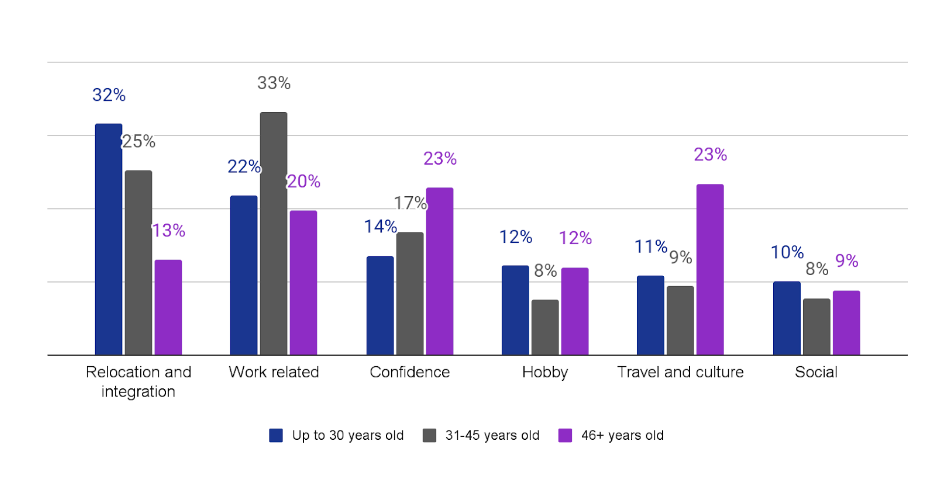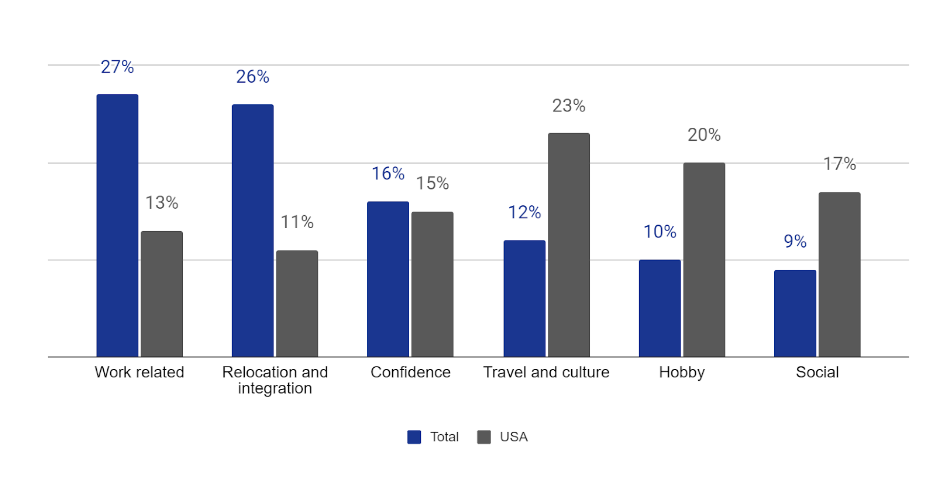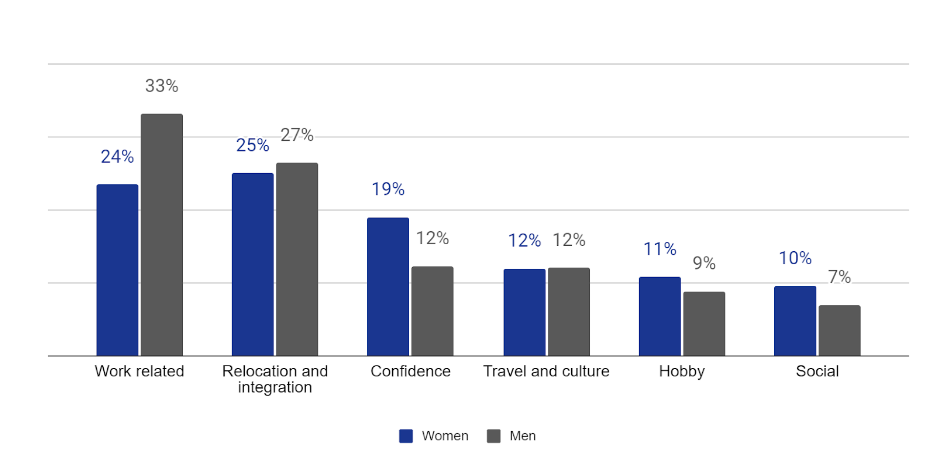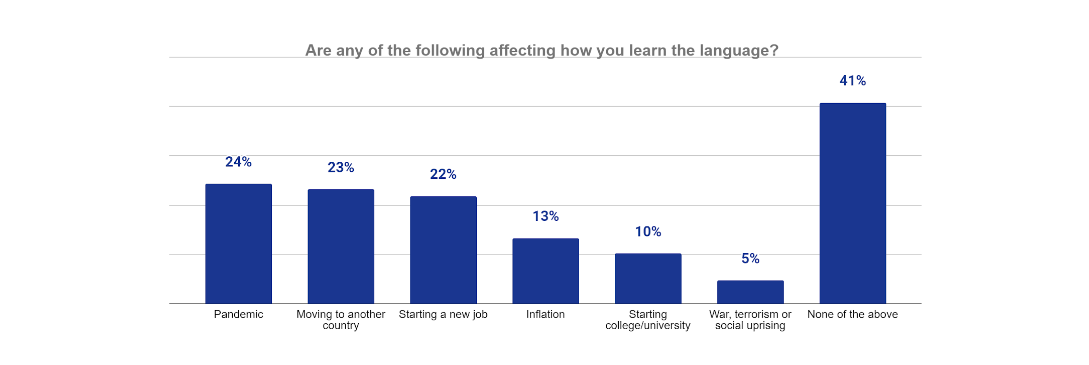
Thanks for subscribing!
Check your inbox and confirm your email address to receive offers and updates.
Written by: Jakob Straub
Published on: Nov 11th, 2022
In a recent survey among over 1,200 Lingoda students, we asked participants to share how long it took them to feel confident conversing in the language they’re learning. Of those who reported feeling more confident, around half said they felt comfortable speaking after fewer than 20 classes, while one-third said that it took them fewer than 10.
Among respondents, women reported gaining confidence quicker than men. Female language learners were more likely than men to say it took them 10 classes or fewer to reach conversational confidence in a new language.
Apart from gender, age is a deciding factor in how soon students converse with confidence. Age also determines the motivational factors for language learning. Read the full report below.
| Among Lingoda students who feel confident speaking their new language, one-third said it took fewer than 10 classes to feel confident in conversation. Meanwhile, around half said it took fewer than 20 classes to feel that way. |
| Women reported gaining confidence more quickly: 30% of female respondents said they started feeling confident speaking their new language within the first 10 classes, compared to only 21% of men. |
| The main drivers for language learning are work-related purposes (27%) and relocation and integration in a new country (26%). |
| US students placed importance on travel and culture (23%), language learning as a hobby (20%), and social reasons (17%) for motivation. |
Among participants who felt more confident in their speaking abilities at the time of the survey, 30% of women said they felt confident speaking after only 10 classes, whereas only 21% of men said the same. Women were also more likely than men to say they felt more confident after taking 11-20 classes. Men were slightly more likely than women to say overall that they were confident conversing in their new language (67% vs. 64%, respectively).
Now, let’s see how those gender-based stats compare to the overall stats from the survey. When we look at all “confident” respondents from all language levels (A1-C1), nearly one third said they started feeling more confident within 10 classes, and about half said they felt confident after fewer than 20 classes.
Lingoda asked students about the major benefits that motivated them to learn the language they were currently studying. About 23% of respondents above the age of 45 said they were learning for “confidence” and for “travel and culture.” Younger students of up to 30 years of age most often selected “relocation and integration” as their motivation to learn a language (32%). Meanwhile, 33% of 31 to 45-year-old learners said “work-related reasons” were their motivation for learning a language.

Among all survey respondents, “work-related” purposes are the primary driver for 27% of students, closely followed by “relocation and integration” in a new country for 26%. US students, however, most often responded that “travel and culture” were their motivation for language learning (23%), followed by language learning as a “hobby” (20%), and “social” reasons (17%). “Building confidence” seems to carry similar importance: 16% of all participants said it was their motivation, compared to 15% of US participants.

Split by gender, “work-related” reasons become the most important motivational driver for language learning for men: 33% of male respondents selected that answer, yet only 24% of female respondents did. Women most often selected “relocation and integration” as their answer (25%), but learned significantly more often for “building confidence” with 19% compared to only 12%. In correlation with the above answers regarding the number of classes learners required before gaining confidence, the data seems to suggest that women achieve this goal early on. Overall, motivation for language learning varies more with age than by gender.

The reason for the significant variation for language learning motivation among the different age groups is open to speculation. It seems reasonable to assume that students up to 30 years of age are most likely to move and study abroad, and therefore answered accordingly, while 31 to 45-year-old participants are likely to be at an important stage in their career or professional life and place importance on work-related reasons. A study on the role of employee proactivity in relation to age seems to support this.
Larger ongoing trends might also influence these numbers, though Lingoda did not collect any related data. The Great Resignation describes the increased rate of workers quitting their jobs as a response to the Covid-19 pandemic, to reevaluate their career, working conditions, and life goals. The term was coined in the US, where 47.8 million workers left their jobs voluntarily in 2021. In Europe, short-time work programs helped employees stay put and employment numbers didn’t drop so drastically. However, in a reshuffle in EU job markets, workers traded their jobs for better ones.
Language learners motivated by work-related reasons likely view language skills as a way to improve their career opportunities. Regardless of career, the flexibility to fit online classes into their schedule is among the key factors why students choose Lingoda as a platform.
Lingoda also polled participants on the factors affecting how they were learning the language they were currently studying. 23% of respondents said that moving to another country had the biggest impact, while 22% responded that starting a new job had an effect. The ongoing pandemic impacted 24% of survey participants.

While the top three responses appear similar for all survey participants, how they affect learners differ. Moving to another country gave 58% of that subset of respondents more motivation to learn and 29% more time. It seems reasonable to assume that these learners achieved conversational confidence quicker than those without the “boosting effects” of extra time and motivation.
Similarly, starting a new job seems to have the opposite effect. 45% of participants who reported having a new job said they had less time for Lingoda classes, while 39% said they dedicated less time to language study outside of Lingoda classes. Even though it might take these learners longer to gain confidence, their motivation was still up: 40% reported they were motivated to learn.
The pandemic also continues to provide free time and motivation to language learners, which corresponds with the findings of a previous Lingoda study on the impact of Covid-19 on language students. Of the 24% of participants who said to be affected by the pandemic, 49% reported more time and 45% more motivation, and we can speculate that they’re among the respondents who felt confident after relatively few language classes.
The most interesting fact about language learning confidence is that women place greater importance on confidence as the motivational factor for language learning, and then follow through and gain confidence quicker than men. Yet there is greater variation for language learning motivation with age than by gender, which corresponds to what is important for learners at different life stages.
It’s no surprise that the ongoing pandemic and trends such as the Great Resignation continue to affect language learners. Those who have more free time report increased motivation and likely achieve conversational confidence with fewer classes. But even learners who have less study time available because of a change in their job situation don’t experience a significant drop in motivation and keep at it, even though it might take them more classes to feel confident. Continuous learning is key, and thanks to the flexibility of online learning, Lingoda students can keep up with their classes even when their day-to-day schedule changes.
Lingoda collected quantitative data in an online survey over a period from June 20, 2022, to June 26, 2022, from language learners with a currently active Lingoda account. The survey respondents answered questions around their learning motivation and behavior, conversation confidence, and the impacts of life changes on their language learning habits.
Of the 1,255 respondents in total, 803 identified as female, and 430 as male. Gender-based questions excluded 22 “non-binary” and “self-described” respondents. 215 of the total respondents came from the US. 509 of the students polled were 30 years old or younger, 554 were between 31 and 45 years old, while 192 were 46 years and older.